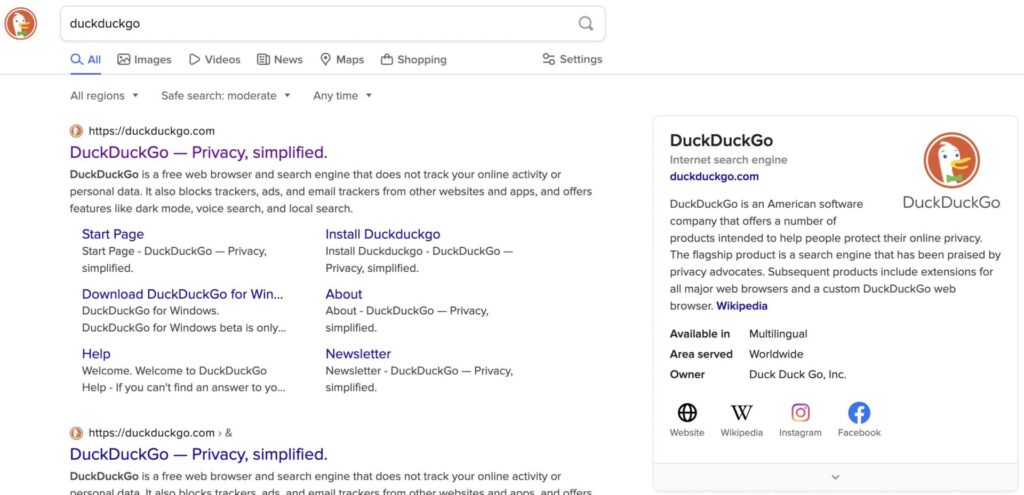Duckduckgo is one of the most popular search engines in the world. It’s an alternative to Google and provides users with a clean, easy-to-use homepage that is ad-free, private, and secure. Millions of people around the world use this search engine because it offers more privacy than its competitors.
But is Duckduckgo safe to use? Let’s find out by examining more about this search engine.
Is Duckduckgo Safe to Use?
Yes, DuckDuckGo is generally considered safe to use, particularly if you’re concerned about privacy. Unlike some other search engines, DuckDuckGo emphasizes protecting user privacy. Here are a few reasons why DuckDuckGo is considered safe:
- Privacy-focused: DuckDuckGo doesn’t track your search history, so your searches aren’t used to build a personal profile on you. This means you’re less likely to be targeted by personalized ads based on your search history.
- Encryption: It uses secure, encrypted connections (HTTPS) to protect your search activity from being intercepted by third parties when possible.
- Transparent Policies: DuckDuckGo is transparent about its privacy policy, stating clearly that it does not collect or share personal information.
- Tracker Blocking: It also offers features to block tracking cookies from third-party sites, further enhancing your privacy.

DuckDuckGo is considered safe to use mainly because of its strong privacy policies and features designed to protect user data. The search engine doesn’t track users’ search history, which prevents the creation of a personal profile based on your queries. This approach significantly reduces the risk of your data being used for targeted advertising or profiling by third parties. DuckDuckGo also employs secure, encrypted connections (HTTPS) to safeguard your search activities from potential eavesdropping, adding an extra layer of security between your device and their servers.
DuckDuckGo actively blocks tracking cookies from third-party sites, which can track your movements across the web and gather data about your online behavior without your consent. Their transparency about privacy policies is a key aspect of their safety, as they clearly communicate their practices to users, ensuring there are no hidden surprises about how your data is handled.
How Does Duckduckgo Work?
DuckDuckGo operates somewhat differently from other search engines, with a strong focus on user privacy and delivering results without personalized tracking. Here’s an overview of how it works:
Privacy-First Approach
- No Personal Tracking: Unlike many other search engines, DuckDuckGo does not track users. It doesn’t store search history, IP addresses, or user agent information. This means your searches are not used to build a profile on you, and you receive search results without personalization based on past searches.
Search Results
- Aggregation from Various Sources: DuckDuckGo compiles its search results from a variety of sources. This includes more than 400 sources, among which are other search engines (like Bing, Yahoo), crowd-sourced sites (like Wikipedia), and DuckDuckGo’s own crawler (DuckDuckBot). It also utilizes partnerships with other search providers to access their indexes and improve the breadth of results.
- Instant Answers: DuckDuckGo offers Instant Answers for many queries, which appear at the top of the search results. These are meant to provide quick information without needing to click through to a website. These answers are pulled from various sources and are also contributed to by the DuckDuckGo community through its open-source platform, DuckDuckHack.
Security Features
- HTTPS Encryption: DuckDuckGo uses HTTPS to secure the connection between the user and the DuckDuckGo servers, ensuring that search queries are encrypted and protected from interception.
- Tracker Blocking: In addition to not tracking users itself, DuckDuckGo also offers features in its browser extensions and mobile apps to block third-party trackers on websites you visit from your search results. This helps protect your browsing privacy beyond the search page.
User Experience
- Bangs: DuckDuckGo provides a feature called “Bangs,” which allows users to search directly on other websites from the DuckDuckGo search bar by typing an exclamation mark followed by a shortcut for the website (e.g., “!wikipedia” for Wikipedia).
- Themes and Settings: Users can customize their search experience with themes and various settings, enhancing usability and visual preference without compromising privacy.

Pros and Cons of Duckduckgo
Using DuckDuckGo as your search engine comes with its set of advantages and drawbacks, primarily centered around its focus on privacy and how it affects the user experience.
Pros of Using DuckDuckGo
- Privacy Protection: The most significant advantage is its strict privacy policy. DuckDuckGo doesn’t track your searches or store personal data. This means there’s no data profiling or personalized ad targeting.
- Minimal Ads: DuckDuckGo shows fewer ads, and the ads it does show are based on the current search query rather than your search history.
- Prevents Search Leakage: By default, DuckDuckGo prevents your search terms from being shared with the sites you click on, offering an additional layer of privacy.
- Customizable User Experience: Users can customize the look and feel of the search engine, including themes and settings, to tailor the browsing experience to their preferences.
- Instant Answers and Bangs: DuckDuckGo offers Instant Answers for quick information and “Bangs” for direct searching on other sites, making certain queries more convenient.
Cons of Using DuckDuckGo
- Less Personalized Results: Because it doesn’t track your search history, DuckDuckGo can’t offer personalized search results or recommendations. This might lead to less relevant results for some queries compared to engines that use personal data to refine searches.
- Smaller Index: DuckDuckGo relies on various sources for its results, including other search engines, but it doesn’t have as comprehensive an index as Google. This can sometimes result in less detailed search outcomes or missing out on newer content until it’s indexed by its sources.
- Features and Integrations: While DuckDuckGo has many useful features, it might lack some of the integrations and services tied to Google’s ecosystem, such as Google Maps, Google Scholar, or the deep integration with Android devices.
- Speed and Efficiency: While generally fast, DuckDuckGo might sometimes be slower in returning searches compared to Google, especially for very specific or less common queries.
- Brand Recognition and Trust: Some users might be hesitant to switch from more widely recognized search engines like Google due to familiarity and perceived trustworthiness, even if privacy is a concern.
Choosing DuckDuckGo is often a trade-off between benefiting from enhanced privacy and accepting certain limitations in personalization and search comprehensiveness. The decision largely depends on what you prioritize in your online experience: privacy and simplicity or the depth and personalization of search results.
The Takeaway
DuckDuckGo’s emphasis on not collecting or sharing personal information, coupled with its efforts to block external trackers and ensure secure connections, makes it a safer option for users who prioritize privacy and want to reduce their online footprint.